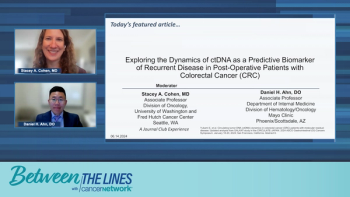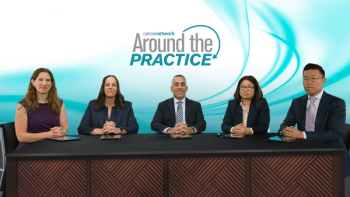
Stacey A. Cohen, MD, and Daniel H. Ahn, DO, share their key takeaways on the clinical utility of ctDNA in the treatment of patients with colorectal cancer.

Your AI-Trained Oncology Knowledge Connection!


Stacey A. Cohen, MD, and Daniel H. Ahn, DO, share their key takeaways on the clinical utility of ctDNA in the treatment of patients with colorectal cancer.

Experts on colorectal cancer brainstorm ways to optimize clinical research on ctDNA and discuss patient perceptions of ctDNA testing.

Daniel H. Ahn, DO, and Stacey A. Cohen, MD, discuss the COBRA clinical trial, which evaluated rates of ctDNA clearance in patients with colorectal cancer receiving assay-directed therapy.

Stacey A. Cohen, MD, and Daniel H. Ahn, DO, provide comprehensive insights on the DYNAMIC clinical trial, an interventional study of circulating tumor DNA in colorectal cancer.

Colorectal cancer specialists review recent updates from BESPOKE-CRC evaluating the utilization of circulating tumor DNA for informing adjuvant therapy in patients with colorectal cancer.

Medical oncologists discuss whether ctDNA clearance can serve as an acceptable surrogate end point in the treatment of patients with colorectal cancer.

Daniel H. Ahn, DO, and Stacey A. Cohen, MD, engage in a comprehensive discussion on recent findings from the GALAXY study in CIRCULATE-Japan.

Experts on colorectal cancer share insights on optimizing the frequency of ctDNA detection and discuss potential ways to overcome challenges associated with MRD detection.

GI medical oncologists review recent findings from the INTERCEPT study evaluating the prognostic performance of circulating tumor DNA in clinical practice.

Stacey A. Cohen, MD, and Daniel H. Ahn, DO, discuss the role of circulating tumor DNA (ctDNA) as a biomarker in colorectal cancer and provide clinical insights on screening modalities.

The panelists close by emphasizing key takeaways regarding the management of HER2+ colorectal cancer, including early molecular profiling to enable targeted therapy sequencing, assessing HER2 amplification level, and having a strategic plan upfront mapping out potential targeted therapy options rather than just starting chemotherapy.

Drs Ciombor and Ahn discuss emerging HER2-targeted therapies in colorectal cancer, including antibody-drug conjugates and novel antibodies.

The panel reviews treatment strategies for HER2-positive metastatic colorectal cancer patients in various scenarios, including those with HER2 mutations, RAS mutations, and different levels of HER2 expression, emphasizing the importance of reprofiling and considering the duration of response before changing treatment approaches.

Experts explore the management of interstitial lung disease in patients with colorectal cancer receiving treatment with trastuzumab deruxtecan and the consideration of liquid biopsies to assess HER2 status and adapt treatment strategies.

Dr Stacy A. Cohen discusses the DESTINY-CRC01 trial investigating trastuzumab deruxtecan in patients with colorectal cancer, specifically addressing the use of a targeted therapy for HER2 in colorectal cancer patients, highlighting the importance of prior therapy history and optimal dosage to balance efficacy and toxicity.

Tanios S. Bekaii-Saab, MD, presents the case of a 64-year-old woman with HER2+ colorectal cancer to the panel for discussion.

Kristen K. Ciombor, MD, discussed the ongoing MOUNTAINEER-03 trial, a global Phase 3 study randomizing patients with untreated HER2-positive colorectal cancer patients to FOLFOX plus tucatinib/trastuzumab versus standard chemotherapy plus a biologic, which she said highlights the importance of upfront molecular testing and could change treatment.

Toxicities with tucatinib in patients with colorectal cancer like fatigue and GI issues are generally manageable but still require close monitoring, with early optimization of diarrhea management being key to allow patients to stay on effective treatment long-term.

In the Phase 2 MOUNTAINEER-01 study of patients with HER2-positive metastatic colorectal cancer who were chemo-refractory, the combination of tucatinib and trastuzumab showed an impressive response rate and disease control rate, and median duration of response up to 12 months; Dr. Ahn notes these results compare favorably to prior studies of dual HER2 inhibition, with MOUNTAINEER-01 showing higher response rates.

Christina S. Wu, MB, BCh, MD, presents the case of a 50-year-old man with metastatic colorectal cancer to the panel for discussion.

Drs Cohen, Wu, and Ahn discuss HER2 in colorectal cancer, explaining that increased expression indicates possible benefit from HER2 inhibitors; Ahn summarized studies showing modest activity of dual HER2 inhibition compared to single agent trastuzumab.

Drs Wu, Ciombor, and Cohen discussed upfront molecular testing in patients with colorectal cancer to guide treatment, with Dr Ciombor reviewing HER2 testing methods and Dr Cohen noting liquid biopsy limitations.

Drs Ahn and Cohen discuss the treatment of colorectal cancer, reviewing the available options and describing factors influencing treatment choice and use of maintenance therapy after initial response.

Stacy A. Cohen, MD, provides an overview of colorectal cancer, noting increasing incidence in younger patients; Christina S. Wu, MB, BCh, MD, discussed possible reasons for more colorectal cancer in younger people, including genetic predisposition and exposures, though the causes remain unclear.

The expert panel offers closing thoughts on MRD assessment and how ctDNA has been incorporated into clinical practice in the treatment of colorectal cancer.

Specialists on colorectal cancer discuss the effect of MRD on monitoring strategies and adjuvant therapy decisions for patients with colorectal cancer.

An overview colorectal cancer clinical trials studying early intervention based on MRD positivity.

Aparna Parikh, MD, MS, talks about the MD Anderson INTERCEPT program, which is studying the relationship between ctDNA and recurrence in colorectal cancer.

Daniel H. Ahn, DO, discusses the CIRCULATE-Japan trial, which is studying how ctDNA can be used to guide adjuvant therapy in colorectal cancer.

The panel compares cfDNA with ctDNA for assessing MRD, and outlines when ctDNA testing is ordered and how it’s collected.

Published: November 28th 2023 | Updated:

Published: February 24th 2023 | Updated:

Published: July 7th 2023 | Updated:

Published: December 5th 2023 | Updated:

Published: December 5th 2023 | Updated:

Published: February 16th 2023 | Updated: